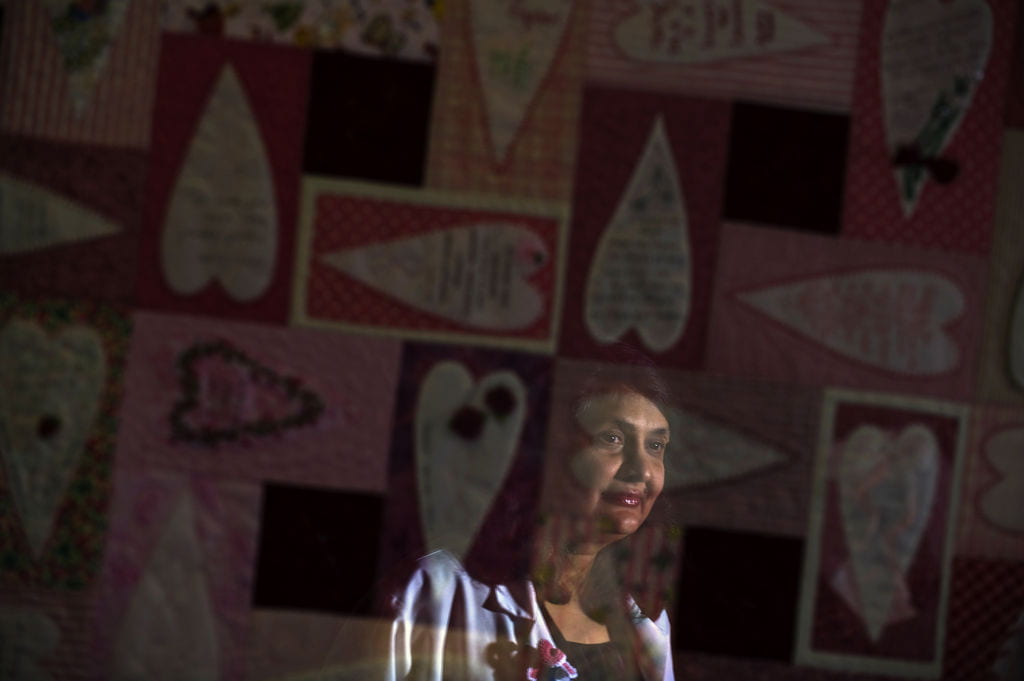Breast cancer researcher targets tumors
Dr. Rita Mehta’s research has led to more effective breast cancer treatments, with lifesaving results.

In 2003, oncologist Dr. Rita Mehta had “the kind of moment everyone lives for” – everyone, that is, who’s working to find a cure for cancer.
Mehta, a health sciences associate professor of medicine at the Chao Family Comprehensive Cancer Center, was one of the first researchers to use chemotherapy combined with the drug trastuzumab (trade name Herceptin) on women with breast cancer
before – rather than after – surgery.
Five patients in advanced stages of the disease participated in her original clinical trial, receiving the so-called optimized systemic treatment. One by one, over a period of several months, their breast image scans came in, looking like colorful Rorschach tests. Mehta liked what she saw.
“The tumors were disappearing before our very eyes,” she recalls. “When we reviewed the fifth patient’s scans, we realized we had a 100 percent response rate. That’s when I knew the treatment wasn’t just a fluke.”
Mehta, who works in hematology/oncology at UC Irvine Medical Center, published
her findings and played a pivotal role in convincing the medical establishment to routinely administer chemotherapy and trastuzumab prior to breast cancer surgery.
“I felt like someone from the future. I used this treatment before it became standard procedure because I knew it saved lives,” she says.
Today Mehta continues to advance breast cancer research, conducting numerous
clinical trials to improve chemotherapeutic regimens and incorporate new biological compounds to target tumors.
“I’m looking for the characteristics in tumors that make patients respond to certain drugs,” she says. “The preoperative setting is perfect for these studies, because in postoperative patients you’ve already removed the tumor. You’re targeting cells you cannot see. But if there’s a tumor there in front of you, you can see if a drug works.”
To illustrate this, Mehta turns to her computer and calls up a series of four MRI scans. In the first, the cancer has nearly taken over the breast; the mass then shrinks as the patient undergoes the chemotherapy treatment until, in the final image, it’s invisible.
“In many cases, the tumors disappeared entirely. We had complete responses [no microscopic evidence of cancer] in four to five months,” she says. “Patients would have surgery, and doctors couldn’t find the tumors because they were gone. Many who would have had a mastectomy were able to have a lumpectomy instead.”
Mehta recently presented data at the annual meeting of the American Society of Clinical Oncology showing that, since her first clinical trial in 2003, patients with stage II and III breast cancer experienced the highest complete response rates ever reported.
In her small study of about 50 patients, women with stage II breast cancer had a 100
percent survival rate – compared to the historical rate of 86 percent. Those with stage III breast cancer had a 94 percent survival rate – compared to the historical rate of 57 percent.
In 2004, Irvine resident Christine Ortega discovered a rash on her left breast. The rash, it turned out, was caused by inflammatory breast cancer, a rare and aggressive form of the disease. Mehta became her primary oncologist at the UC Irvine Breast Health Center and asked if she’d participate in a clinical trial.
“I figured, ‘What do I have to lose?'” Ortega says. In fact, she had everything to gain. Administered before surgery, the chemotherapy/trastuzumab made her 8-centimeter tumor disappear completely on an MRI scan. When she later had a mastectomy as a
precautionary treatment to remove any stray cancer cells, none were detected. Now 56, Ortega has been in remission for more than five years.
“Dr. Mehta is amazing. The treatment was a huge success,” she says. “I credit her as one of the people at the Breast Health Center who saved my life.”
Mehta came to UCI in 1992 for fellowship training in hematology/oncology after earning a medical degree from Mahatma Gandhi Memorial Medical College in her native India.
Since then, she’s been principal investigator on many clinical trials. She recently studied patients with triple-negative breast cancer, a particularly virulent form of the disease that lacks the three receptors targeted by the most successful treatments.
Mehta put these women on an accelerated schedule of preoperative chemotherapy treatment — with doses biweekly or weekly instead of every three weeks. Her results, published as a letter in the Journal of Clinical Oncology, showed a survival rate of 93 percent, compared to the historical rate of 74 percent.
She also belongs to a UCI research team investigating a new handheld laser scanner
for detecting and diagnosing breast cancer. Mehta has started using it to evaluate patient response to chemotherapy before surgery. Someday, she speculates, the device could become common practice.
It wouldn’t be the first time she’s led the way in the fight against breast cancer.